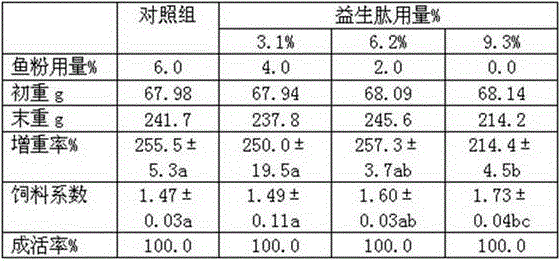A method for producing prebiotic peptides by two-step solid-state fermentation of peanut meal
A technology of solid-state fermentation and peanut meal, which is applied in the field of animal feed and bioengineering, can solve problems such as difficulty in functioning of bacillus and neutral protease, inconsistent demand, limited content of beneficial metabolites, etc., to enhance disease prevention and resistance, The effect of stable quality and outstanding substantive features
- Summary
- Abstract
- Description
- Claims
- Application Information
AI Technical Summary
Problems solved by technology
Method used
Image
Examples
Embodiment 1
[0036]Use peanut meal as raw material, mix it with tap water according to the material-water ratio 1:0.8, and then sterilize at 121°C for 20 minutes. After sterilization, add 2% (v / w) of peanut meal weight into Aspergillus niger (CGMCCNo.9183) spore liquid After mixing evenly, culture at 28°C~32°C for 28h, and turn the material every 4h; after the cultivation is completed, mix 3 batches, and add 10% (v / w) Pediococcus pentosaceae (CGMCCNo.9182) according to the weight of peanut meal ), mixed evenly, and anaerobically fermented at 37°C~46°C for 42 hours, dried and pulverized at 60°C after the fermentation was completed, to obtain the probiotic peptide. The peptide content of the probiotic peptide reaches 28.4%, the lactic acid content reaches 8.8%, and the number of viable lactic acid bacteria reaches 1.2×10 9 CFU / g, acid protease reaches 228U / g.
Embodiment 2
[0038] Use peanut meal as raw material, mix it with tap water according to the material-water ratio 1:0.8, and then sterilize at 121°C for 20 minutes. After sterilization, add 2% (v / w) of peanut meal weight into Aspergillus niger (CGMCCNo.9183) spore liquid After mixing evenly, culture at 28°C~32°C for 26 hours, and turn the material every 4 hours; after the cultivation is completed, mix 3 batches, and insert 10% (v / w) Pediococcus pentosaceae (CGMCCNo.9182) according to the weight of peanut meal ), mixed evenly and anaerobically fermented at 37°C to 46°C for 36 hours, dried and pulverized at 60°C after the fermentation was completed, to obtain prebiotic peptides. The peptide content of probiotic peptides reaches 26.2%, the lactic acid content reaches 8.3%, and the number of live lactic acid bacteria reaches 1.0×10 9 CFU / g, acid protease reaches 212U / g.
Embodiment 3
[0040] Use peanut meal as raw material, mix it with tap water at a ratio of 1:1.1, and then sterilize at 120°C for 15 minutes. After sterilization, add 2% (v / w) of the weight of peanut meal to Aspergillus niger (CGMCCNo.9183) spore liquid After mixing evenly, culture at 28°C~32°C for 28h, and turn the material every 4h; after the cultivation is completed, mix 3 batches, and add 10% (v / w) Pediococcus pentosaceae (CGMCCNo.9182) according to the weight of peanut meal ), mixed evenly and anaerobically fermented at 37°C to 46°C for 36 hours, dried and pulverized at 60°C after the fermentation was completed, to obtain prebiotic peptides. The peptide content of probiotic peptides reaches 25.4%, the lactic acid content reaches 8.2%, and the number of live lactic acid bacteria reaches 1.0×10 9 CFU / g, acid protease reaches 201U / g.
PUM
 Login to View More
Login to View More Abstract
Description
Claims
Application Information
 Login to View More
Login to View More - R&D Engineer
- R&D Manager
- IP Professional
- Industry Leading Data Capabilities
- Powerful AI technology
- Patent DNA Extraction
Browse by: Latest US Patents, China's latest patents, Technical Efficacy Thesaurus, Application Domain, Technology Topic, Popular Technical Reports.
© 2024 PatSnap. All rights reserved.Legal|Privacy policy|Modern Slavery Act Transparency Statement|Sitemap|About US| Contact US: help@patsnap.com









